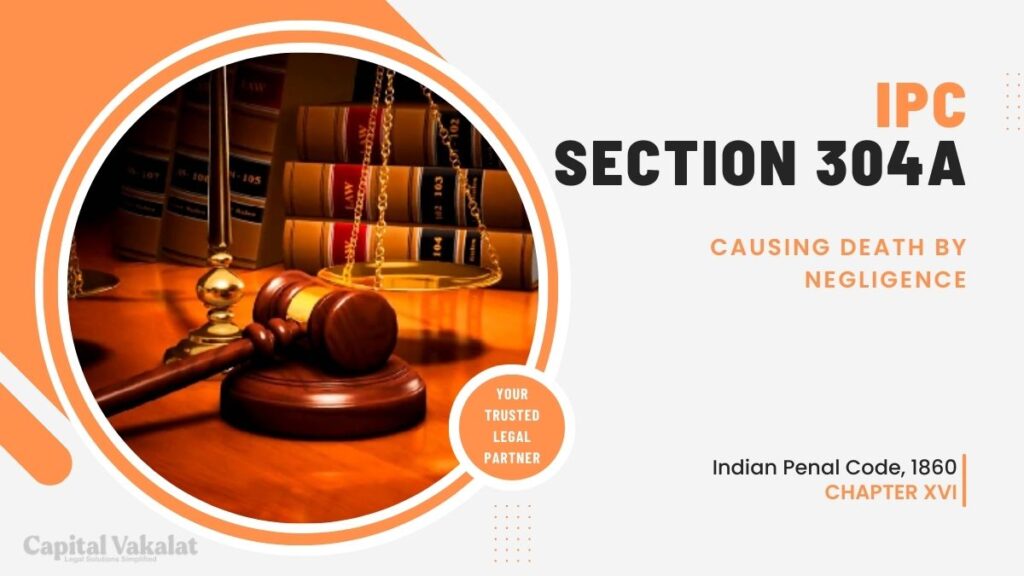Negligence, a term often associated with carelessness or inattentiveness, holds a significant place in the legal realm, especially under Section 304A of the Indian Penal Code (IPC).

This article delves into the intricacies of Section 304A IPC, exploring its elements, legal consequences, notable cases, challenges in prosecution, and the evolving perspectives on this critical legal provision.
Introduction to Section 304A IPC
In the vast landscape of legal provisions, Section 304A IPC stands as a distinctive clause addressing instances where death occurs due to negligence. This section plays a pivotal role in the Indian legal system, outlining the consequences for those found responsible for causing death by negligence.
Understanding Negligence
Before delving into the legal nuances of Section 304A IPC, it is essential to comprehend the concept of negligence. Negligence, in legal terms, refers to the failure to exercise reasonable care, resulting in harm to others. This section specifically deals with cases where negligence leads to fatal outcomes.
Elements of Section 304A IPC
Establishing a case under Section 304A involves proving two crucial elements – the act of negligence and the causation of death. The legal system requires a meticulous examination of circumstances to determine culpability under this section.
Legal Consequences
The consequences outlined in Section 304A IPC are not only punitive but also serve as a deterrent. Offenders may face imprisonment and fines, and understanding the judicial precedents can provide insights into the severity of the penalties.
Cases That Fall Under Section 304A IPC
Real-life examples serve as poignant reminders of the impact of negligence on human lives. This section explores various cases that have fallen under the purview of Section 304A IPC, offering a glimpse into the diverse scenarios that lead to legal consequences.
Challenges in Prosecution
Despite the apparent clarity of Section 304A IPC, prosecuting offenders poses challenges. From difficulties in proving negligence to factors influencing legal outcomes, understanding these challenges is crucial for a comprehensive grasp of the legal landscape.
Public Awareness and Safety Measures
Preventing instances covered under Section 304A requires not just legal consequences but also a collective effort towards awareness and safety. This section emphasizes the role of public awareness campaigns and the implementation of safety measures.
Comparative Analysis with Other Legal Sections
To understand the unique aspects of Section 304A IPC, a comparative analysis with related legal sections is essential. This section contrasts Section 304A with other relevant provisions, shedding light on the legal nuances and implications.
The Role of Forensic Evidence
In Section 304A cases, forensic evidence plays a crucial role in establishing the facts. This section explores the significance of forensic evidence in ensuring fair and accurate legal proceedings.
Critique and Evolving Legal Perspectives
While Section 304A serves its purpose, it is essential to critically analyze its effectiveness. This section offers a critique of the section and suggests potential legal improvements and reforms to address contemporary challenges.
Conclusion
Section 304A IPC, addressing death caused by negligence, encapsulates the legal complexities surrounding such incidents. From understanding negligence to exploring legal consequences, this article has navigated through the multifaceted dimensions of Section 304A. As society evolves, so must legal provisions, and the critique presented here serves as a foundation for ongoing discussions and potential reforms.
Frequently Asked Questions
Are there any specific safety measures recommended to prevent cases under Section 304A?
Public awareness campaigns and stringent safety measures in various sectors can contribute to preventing negligence-related deaths.
Can Section 304A cases be challenging to prosecute?
Yes, proving negligence and causation can be challenging, and legal proceedings often involve a meticulous examination of circumstances.
How does Section 304A IPC differ from other legal provisions related to negligence?
Section 304A IPC specifically deals with cases where negligence leads to death, distinguishing it from other provisions addressing non-fatal negligence.
Are there ongoing discussions about reforming Section 304A IPC?
Yes, there are ongoing discussions regarding potential reforms to address challenges and ensure the section remains effective in contemporary legal contexts.